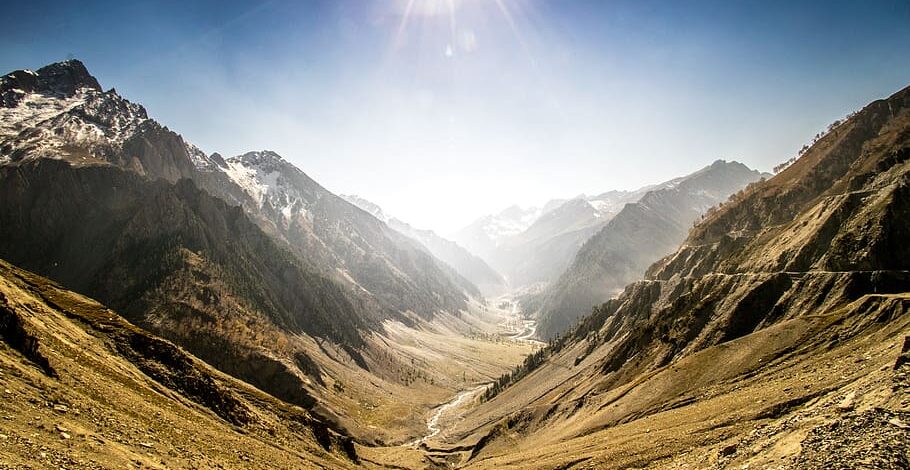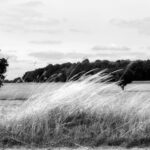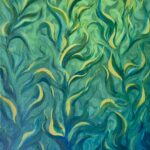By Raymond Anganes
There was some blue in the sky, just far enough away to give Juliana hope. While the storm battered against her shelter of pine branches and ferns glued with clay, sun shone in the distance and light came down in rays through the storm clouds. Her stomach had long since given up its growling, and she wished her body would stop its trembling. Any movement was a waste of energy. She sat cross-legged in the fire-pit, shielding the little flame with her body and holding onto the warmth of damp coals and embers beneath her thighs.
“This is the last storm,” she whispered to herself over and over. “This is the last storm.”
The sunlight wasn’t mocking her. It didn’t dare her to chase it. Daylight was coming to banish this gray darkness, and divine winds blew the clouds out into other lands. Whether the cuts, the bruises, or the cold had broken her every nerve, Juliana could hardly feel her arms or legs. Even her broken ankle had gone numb. The thought of sunshine on her face was all that kept her eyes from closing. She hunched over the flame in her lap, letting any rain that got through her shelter break upon her back.
Wind howled and cold rainwater cut at every still-living nerve. How long had she survived out here? Five weeks? Seven? She stopped counting after day twenty-five. It had been too long. Nobody was coming for her. Nobody would find her out here in this stretch of the Nahanni Valley, where hikers were banned from treading. But Juliana couldn’t help herself, couldn’t help but seek out natural wonders hidden away from human eyes. Now all her dreams were of cityscapes, of houses with electric heating.
She clenched her teeth together. She would survive one more storm. She would not leave this fire to burn alone. It had stayed alive through storms and wild animal attacks alike. It had given her its burning sticks to wield as weapons, its light to forage and scout by, and its warmth to fill her heart and sustain her flesh. But still the rain and wind raged against her, they bit like starving dogs. Juliana breathed in whatever smoke she could, cherishing every ember and warm fleck of ash that stuck to her throat and lungs. Her mother always said to stay away from cigarettes. She never said a thing about campfire ash.
The light moved closer and the wind blew harder. Her shelter creaked and groaned as the storm clawed at it. Pine needles were stripped from its roof and the dried clay mortar grew slippery as the rain saturated it. Even the muddy ground beneath her lean-to’s foundation began to shift.
If the fire survived, Juliana knew she would too. Its flame was small, its heat a mere shadow of its former fury. But it still burned hot enough that she dared not touch it. The searing, radiant heat was a reminder that her body was her own, that it was not just a numb lump of flesh to be devoured by nature itself. The rain subdued the hot coals into quiet warmth, and she dug her fingers down into the ash.
Her cargo khakis were reduced to shorts now. Thorns and jagged stones made sure to slice them away. Juliana only wished she couldn’t see her legs. She wished they were covered. Her inner thighs were nothing but raw skin and scabbed up cuts from long hours of crawling across the forest floor. But her outer thighs were frozen, sacrificed to the rain for the rest of her body’s sake. Her knees and shins had long since been buried beneath the surface of the ash-filled firepit, their bruises and cuts all hidden away from the elements.
Her shelter collapsed. It dumped its water and mud on top of Juliana. She shivered hard, and her eyes would have watered had her tear ducts not been frozen shut. The snow had not come yet, nor would it for some weeks. Had she an igloo, nature would not have dared to demand her life as payment for her pride. But the rolling thunder called her mortal soul, it screamed for her to submit. She defied its rage, denied it the satisfaction of easy prey. Juliana watched the sunlight grow ever closer.
The flame was even weaker now. Water drizzled down her back and across her torso, snaking its way onto the bed of coals. She scrambled to consume the dying fire’s heat. She sucked in the smoke and hunched ever closer to the flame. It was dying. Its life had lasted the weeks she’d been here, and now it was dying. No, no, no! Don’t leave me alone here! ran through Juliana’s mind over and over again. The fire had no pride, no hope of weathering this storm, and it had put its trust in her to protect it.
“I’m sorry little flame,” she whispered to it. “I’m sorry I used you. I’m so sorry.”
She rambled on as the fire fought to boil away the raindrops assailing it. But the battle was done, and the flame went out.
Juliana lay down in the ashes and screamed. Stronger forces of nature had demanded her life before. She’d reached the summit of Everest, she’d sailed in hurricanes, and she’d been lost in the Sahara. Northern Canada would not reduce her to a corpse. The light was on its way. And had her arms any strength to reach outward, she might have even felt its warmth. She owed her life to those she lost along the way, to the dead flames and fallen branches who gave their all, their very lives to protect her from the wrath of Earth itself.
I won’t let them die in vain, she told herself.
I refuse.
And as her hands went cold and the ashes washed away, leaving her body without protection, Juliana felt a gentle stream of molten gold pour down upon the crown of her head. Even as rain still pelted her back, she looked into the blue sky, into the golden sun. Two gods raged in up above, and the mercy of one drove away the malevolent other. She threw her head back and screamed again, defying her fate, defying the fall that left her lost and stranded, defying every inner voice that gently told her to let go.
A new thunder raged in the sky, this one born of steel and petrol rather than clouds and lightning. The pilot of the valkyrie brought his beast in to land at a clearing, mere steps away from her camp. It fell beneath the treeline and the thunder settled to a rumble. Light warmed Juliana’s whole body now, shining down on her as she prayed it would. If only her little fire was here to celebrate this victory. If only her brave little shelter had withstood the wrath of rain and wind. She used all her strength to push her hand into the ashes, then curled her injured fingers around a hardened coal. Men in orange jumpsuits came running out of the clearing, a stretcher borne between the four of them. Juliana held tight to that coal even as they lay her down and flew her away. Ash blew into the wind, off of her skin, and was scattered across the forest as saviors carried her broken body away into the blue sky.
Juliana clutched the coal. She clutched that coal tight.








